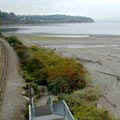|
By Jackie Alan Giuliano, Ph.D.
Let the words of my mouth,
the meditations of my heart
and the actions of my life be as one,
that I may live each day in harmony
with Mother Earth. Amen
-- Jennie Frost Butler
Every day, children are born onto this Earth into dynamic participation with the natural world. The air, the water, and the ground beneath their feet are all innately understood to be parts of their lives. They know nothing of political or private property boundaries.
Yet these children will never get to visit many parts of their world as the affluent homeowners, businesses and industries are allowed to buy up the access to lakes, rivers, and beaches.

One of the many No Trespassing signs preventing access (Photo courtesy
West Virginia Rails to Trails
Council)
Private ownership of our forests, meadows, beaches, riverbanks and lakefronts has reached epidemic proportions in some states. Access to these natural areas has nearly been eliminated in many communities and "No Trespassing" signs are the new badges of achievement for the affluent.
The United Nations has recognized this as a worldwide problem for some time. In 1976, the first UN Conference on Human Settlements was held. Although there have been many such conferences since, the first one described in its final report the conflicting values of property ownership versus public rights to access.
"Land, because of its unique nature and the crucial role it plays in human settlements, cannot be treated as an ordinary asset, controlled by individuals and subject to the pressures and inefficiencies of the market," the UN report said. "Private land ownership is also a principal instrument of accumulation and concentration of wealth and therefore contributes to social injustice; if unchecked, it may become a major obstacle in the planning and implementation of development schemes."
But in our market driven society, the affluent get the pick of the land. Parks and recreation departments at the city, state or federal level cannot compete with the skyrocketing land values.
Discussions of private property rights often go astray with talk of the Founding Fathers and the intention of the U.S. Constitution. Organizations like the Property Rights Congress list the words of James Madison and John Adams at their website and claim, "America's founding fathers understood that without the individual's right to own and control property, no other rights can be protected from government tyranny."
Some analysts of the motivations of the framers of the U.S. Constitution, however, suggest that the language of our Constitution and Bill of Rights was not crafted to be egalitarian. Because those documents forbade government interference in private property, the wealthiest citizens of the new nation had free rein to use their wealth to acquire large tracts of land.
Steven Hill, director of the Center for Voting and Democracy, writes that because the government could not prevent privatization of lands, the richest citizens, including the Founding Fathers themselves, could now "buy, manipulate and otherwise gain control over the democratic process and government itself. This had the net effect of protecting the privileged minority who already owned property, wealth, speech, and the press from the clamoring of the majority who were trying to acquire these same rights and freedoms."

Carkeek Park in Seattle, one of the few remaining coastal access points. (Photo c Jackie
Giuliano)
Today, those decisions have resulted in situations where hundreds of miles of coastland and huge tracts of potential parkland are owned by wealthy individuals who deny access to everyone.
Critics of the practice of leaving some land in the public trust often claim that a community's tax base is increased by developing property, not preserving it. But development projects usually result in an increase in infrastructure and public service requirements. Very quickly, the cost of providing these services often outweighs any additional tax revenue. Environmental costs mount as our rivers, lakes, and oceans are used as waste dumps by many of those who live adjacent to them.
Owners of million dollar homes perched precariously on coastal bluffs will usually deny any access to the splendid views. However, the same landowners will be quick to claim public funds to repair or rebuild their homes when erosion or other geologic forces make them tumble down the hill.
The Surfrider Foundation said in a 1998 article in their publication "Making Waves, "Property rights advocates tend to be conservatives who demand that individuals be held responsible for their actions. Yet they shirk accountability when faced by a dilemma brought on their own poor land management practices."
http://ens.lycos.com/ens/jul2001/2001L-
07-23g.html
|
